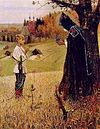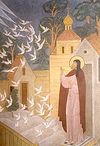

| Previous day | Next day |
| Old Style
July 5
|
Saturday |
New Style
July 18
|
| 6th Week after Pentecost. Tone 4. | No fast.
|
![]() St. Athanasius of Mt. Athos and his six disciples (1000).
St. Athanasius of Mt. Athos and his six disciples (1000). ![]() Uncovering of the relics of St. Sergius of Radonezh (1422).
Uncovering of the relics of St. Sergius of Radonezh (1422).
Martyr Anna, at Rome (304). St. Lampadus, monk, of Irenopolis (10th c.). Sts. Athanasius and Theodosius, of Cherepovets (both ca. 1388), disciples of St. Sergius of Radonezh.
![]() New Martyrs Abbess Elizabeth (Romanova) and Nun Barbara, and those with them: John, Igor, Constantine, Sergius, and Vladimir, princes, and Theodore, at Alapaevsk (1918). New Confessor Agapitus (Taube), monk of Optina Monastery (1936).
New Martyrs Abbess Elizabeth (Romanova) and Nun Barbara, and those with them: John, Igor, Constantine, Sergius, and Vladimir, princes, and Theodore, at Alapaevsk (1918). New Confessor Agapitus (Taube), monk of Optina Monastery (1936).
Hieromartyr Stephen, bishop of Rhegium, disciple of Apostle Paul, and with him Bishop Suerus and the women Agnes, Felicitas, and Perpetua (1st c.). Hieromartyr Athanasius, deacon, of Jerusalem (451). St. Morwenna, patroness of Morwenstow (England) (6th c.). New Martyr Cyprian of Koutloumousiou, Mt. Athos (1679). Synaxis of 23 Saints of Lesbos.
Thoughts for Each Day of the Year
According to the Daily Church Readings from the Word of God
By St. Theophan the Recluse

Saturday. [Rom. 9:1-5; Matt. 9:18-26]
The woman with the issue of blood said: If I may but touch His garment, (the Lord’s), I shall be whole, and she received healing according to her faith. We, the sensual, need physical contact in order to receive intangible strength. The Lord arranged things this way. His holy Church has a visible structure. Its various parts embrace us and we touch them. The power of God, found inside the Church, is received through such contact by those who have a receiver—faith, which says: “If I may but touch, I shall be made whole.” The Church is the body and garment of the Lord. The most visible parts, which we touch, are the Divine Mysteries, particularly baptism and Chrismation, the Sacrament of the Lord’s Body and Blood in conjunction with the Sacrament of confession. But contact with all the other aspects can draw needed strength from the Lord, Who is everywhere. He sees each person who does this, and says to his heart, “Be bold, my child!” Free-thinkers, antagonistic toward the external rites of the Church, thus deprive themselves of the opportunity to enter into contact with the inner, divine, all-animating power. This is why they remain sick, and exhausting themselves with the flow of vain thoughts and feelings, they dry up spiritually and die.














